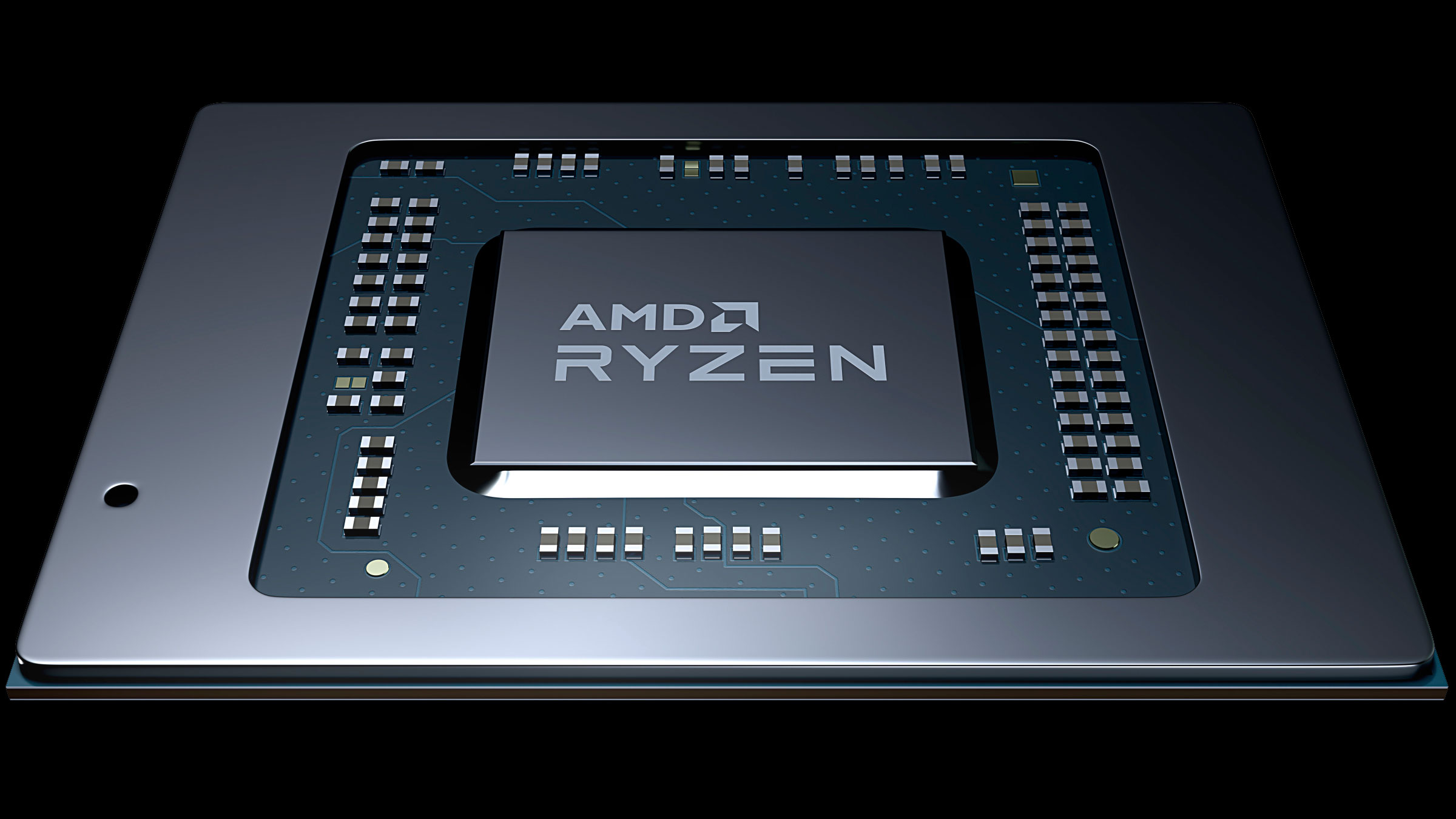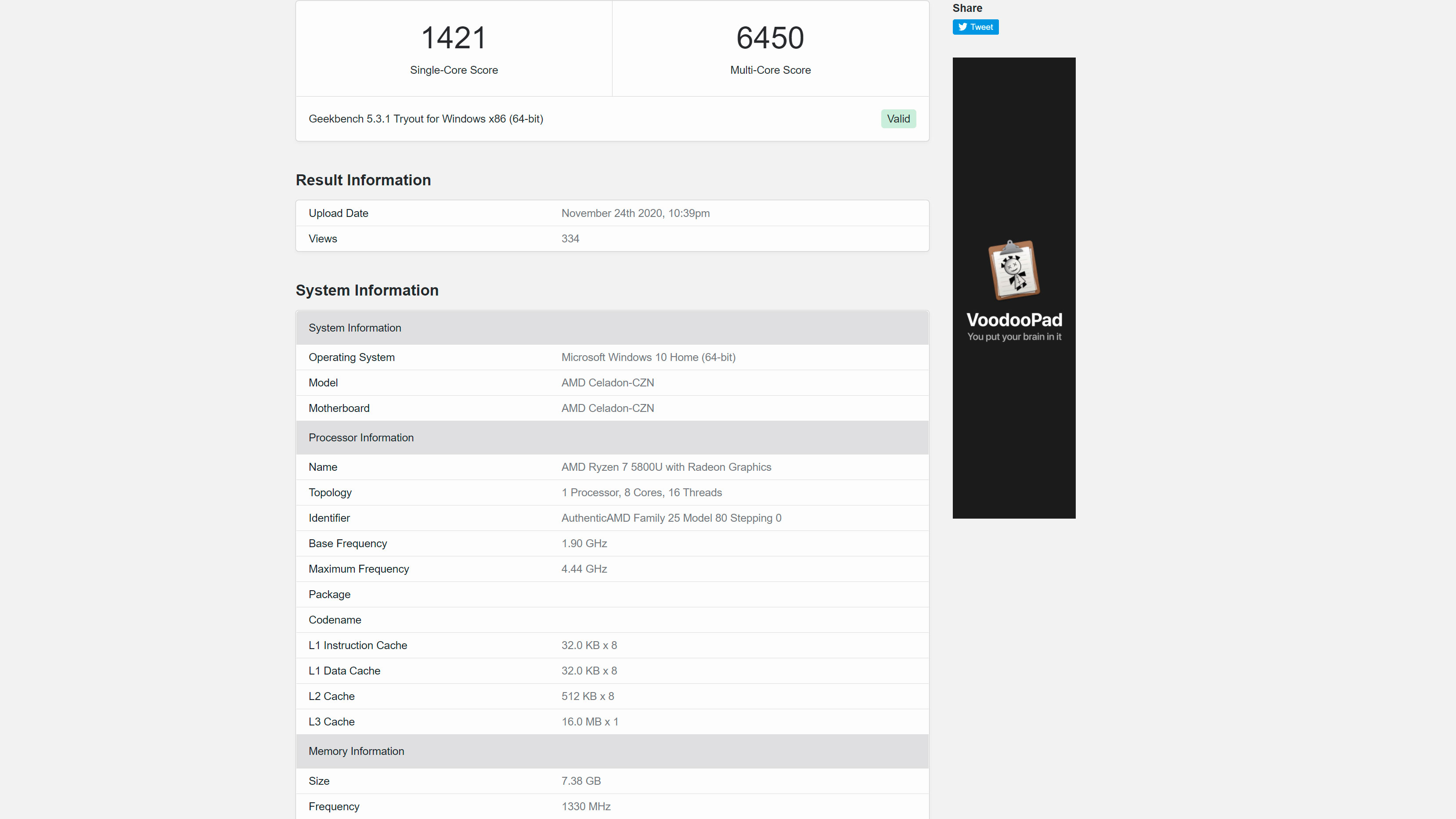Ryzen 7 5800U Teases What Zen 3 Can Do For APUs

The Ryzen 7 5800U (via Leakbench) is the first Ryzen 5000 (Cezanne) mobile APU to appear in the wild. The Ryzen 5000 branding will cause a bit of chaos in the mobile space.
The current rumor is that are two different families of APUs under the Ryzen 5000 umbrella. First, there is Lucienne, which is believed to be a refresh of Renoir with improved clocked speeds. Therefore, it should still use the common recipe of Zen 2 cores with Vega graphics. Then there's Cezanne, which is rumored to wield Zen 3 cores finally. However, Cezanne would likely still employ the Vega graphics engine.
The Geekbench 5 submission for the Ryzen 7 5800U mentions "AMD Celadon-CZN," and if you recall, Celadon was the codename for Renoir motherboards. That means the CZN should be the designator for Cezanne. The model name alone is enough to deduce that the Ryzen 7 5800U is the direct successor to the Ryzen 7 4800U, the flagship of the current Ryzen 4000 (Renoir) U-series lineup.
AMD Ryzen 5000 Cezanne Specifications
| Processor | Cores / Threads | Base Clock (GHz) | Boost Clock (GHz) | L2 Cache (MB) | L3 Cache (MB) | Compute Units | Graphics Frequency |
|---|---|---|---|---|---|---|---|
| Ryzen 7 5800U* | 8 / 16 | 1.9 | 4.4 | 4 | 16 | ? | ? |
| Ryzen 7 4800U | 8 / 16 | 1.8 | 4.2 | 4 | 8 | 8 | 1,750 |
*Specifications are unconfirmed.
The Ryzen 7 5800U is reportedly configured with eight cores and 16 threads. Even though Cezanne could be on the Zen 3 microarchitecture, the maximum configuration seems to persist. The U-series competes in the 15W segment, so there isn't really much headroom for more cores. If AMD were to add more cores, the chipmaker might have to reduce the clock speeds drastically.
The Ryzen 7 5800U isn't much faster from a clock speed perspective than the Ryzen 7 4800U. The unannounced chip seemingly operates with a 1.9 GHz base clock and a 4.4 GHz boost clock. That represents a mere 5.6% and 5.7% uplift for the base and boost clocks, respectively, compared to the Ryzen 7 4800U. We have to bear in mind that Zen 3's forte lies in the vastly improved IPC (instruction per cycle) over Zen 2.
The most interesting tidbit about the Ryzen 7 5800U is the processor's cache configuration. While Ryzen 7 4800U is restricted to 8MB of L3 cache, the Ryzen 7 5800U comes with twice the amount, which should help boost performance quite a bit. The L2 cache, however, remains the same at 4MB.
Get Tom's Hardware's best news and in-depth reviews, straight to your inbox.
The Ryzen 7 5800U had single-and multi-core scores of 1,421 points and 6,450 points, respectively. As a side (but important) note, the octa-core chip was paired with DDR4-2666, so the memory speed probably held the processor back a little. Like its predecessor, Zen 3 natively supports DDR4-3200 memory.
The Ryzen 7 4800U has an average single-score of 1,031 points and a multi-core score of 5,845 points in Geekbench 5. If the data is accurate, the Ryzen 7 5800U was up to 37.8% faster than the Ryzen 7 4800U in single-core performance. In terms of multi-core performance, the Ryzen 7 5800U outperformed the Ryzen 7 4800U by 10.4%. Again, this is Geekbench 5, so it's not the most precise benchmark for comparing processors, but for the moment, it's what's available.
AMD effectively delivered on its promise of an IPC improvement up to 19% with Zen 3 on the company's Ryzen 5000 (Vermeer) desktop processors. The preliminary Geekbench 5 results look promising, and Zen 3 could well be an absolute gamechanger.

Zhiye Liu is a news editor, memory reviewer, and SSD tester at Tom’s Hardware. Although he loves everything that’s hardware, he has a soft spot for CPUs, GPUs, and RAM.
-
OMGPWNTIME The fact they keep using Vega will definitely keep me from purchasing it. I wasn't expecting for the 5000 series APUs to use the newest RDNA 2, but it absolutely should have an RDNA 1 GPU. This being the Notebook/Desktop APU, I guess this means for sure it's going to be a long, long time before we finally have a Ryzen Embedded APU with Zen3 + RDNA and the possibility of a true handheld PC.Reply -
Eliot Alderson ReplyOMGPWNTIME said:The fact they keep using Vega will definitely keep me from purchasing it. I wasn't expecting for the 5000 series APUs to use the newest RDNA 2, but it absolutely should have an RDNA 1 GPU. This being the Notebook/Desktop APU, I guess this means for sure it's going to be a long, long time before we finally have a Ryzen Embedded APU with Zen3 + RDNA and the possibility of a true handheld PC.
AMD said that in low watt envelope of laptops VEGA brings more power than RDNA.
